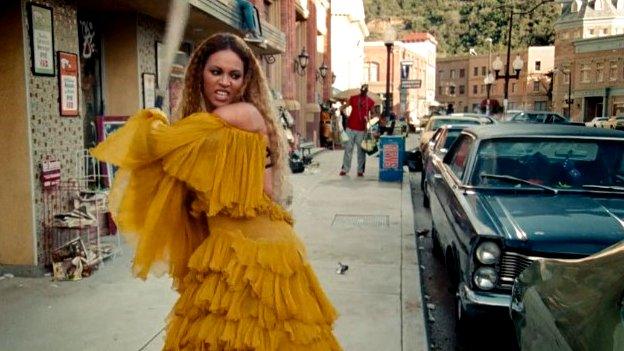MNEK interview: 'Auto-Tune is the elephant in the room'
- Published
MNEK explains how he made his new single At Night (I Think About You)
Pop star MNEK became a professional songwriter at the age of 14, when he signed his first publishing deal. Two years later, he won a silver disc for composing The Saturdays' hit single All Fired Up, external.
Born Uzoechi Emenike in Catford, south-east London, he has now worked with the likes of Madonna, Beyonce, Rudimental, Kylie and Little Mix - to name a few. But after years as a featured artist, the Grammy-nominated writer he is about to break out on his own right.
Never Forget You, a dramatic duet with Swedish singer Zara Larsson, became a global hit last year; and his new single, At Night (I Think About You) is set to do the same.
Amiable, talented and bewilderingly young, the 21-year-old invited the BBC to his cosy studio in East London to illustrate how he constructs a hit song (see the video above).
Along the way, he revealed what it's like to get "the call" from Beyonce, and why Auto-Tune is the "elephant in the room".


MNEK: 'There are 1,000 song ideas on my phone'
What was the first song you wrote?
It was called Paper and Pen, and it was really bad! It was all about songwriting. About how, with my paper and pen, I can sing whatever's on my mind.
It won't be on the album.
So how do you go from that to making hit songs in your teens?
I don't know. I guess I did what everyone does: I put some songs on MySpace and I sent them to everyone I could find. I messaged all my favourite artists and all the record labels and said, "check out my music". And it caught someone's attention. I remember distinctly, I was on my Easter holidays and I was meeting people every day - publishers and managers and lawyers.
And you were still at school at this point. Did your grades suffer?
Schoolwork was always suffering! I hated school! Every weekend, every half-term was me going to a studio and having a session with someone. That was me as a 15 and 16-year-old.
You must have had nerves of steel.
I was just excited. I was just like, "Yeah, sick, I'm getting paid to do what I want to do my whole life".
It gave me a better understanding of life outside Catford. I'd never ventured outside of south-east London. I'd never even taken the tube.
How do you end up working with people like Madonna or Beyonce? Do they just call you up?
I wish! The Beyonce thing actually came about when I met my publisher, John Platt. He heard my EP and said, "I want to get you in with Beyonce". Now, I take everything with a grain of salt because I've been doing this for a while, but then, three days later, it happened. She played me the chorus for Hold Up and then I came back here and recorded all the ideas I had for the song.
You're one of 13 writers on Hold Up. Was it constructed like a Frankenstein's monster?
That process of piecing a song together... I did a whole thing and Beyonce snipped out the pieces she really liked. The end result was this really great, complete song.
There are 13 writers, but seven of them wrote the original song. The rest are because there are samples on the track.
Did your contribution to Madonna's Rebel Heart album work in a similar way?
That was very much like, "OK, you are going to come to this studio, at this time, and record the vocals this way." She brought me over to Metropolis [studios in West London] and we did all the vocals for that song there.
You're obviously a very accomplished singer. Do you ever use Auto-Tune when you record other people's vocals?
Everyone uses Auto-Tune! It's the elephant in the room [that] no-one likes to talk about.
I use Auto-Tune but it's not to mask anything. If you come to see me live, I can sing on the spot. Auto-tune is just for the recording. It keeps everything really precise.
So is the idea of a perfect vocal take history?
Naaah. The thing about Auto-Tune is it can't fix everyone. It only fixes pitch. Everything else - the emotion and the attack and the energy? That's what a singer is.

MNEK has penned three number one singles: Little Mix's Wings; Duke Dumont's Need U (100%); and Oliver Helden's Gecko (Overdrive)
What's difference between writing for other people and for your own album?
I think it differentiates itself. If I'm writing a song for Karen Harding, I know I can't impose what I want to say onto her. I literally have to get into her headspace and think, "what does she want to say?" When it comes to my stuff, it's the same. What can I write that's true to me?
I often get asked if there's a song I wish I'd kept for myself - and it's funny, because that's how Never Forget You came about. It was originally Zara Larsson singing by herself. but it was one of those rare cases where I was like, "Grr, I wish I could sing this!". So I tried a solo version and then the suggestion came for it to be a duet.
And great things happened...
I'm really proud of it. It's the first song I've done that's been a genuine worldwide smash.
So what can we expect from the album when it comes out?
The mantra of the album is the desire to be understood. Because I've written loads of stuff for other artists, there hasn't been a medium for people to get a sense of who I am. So that's what I feel the album is.
And all of it will have been recorded here?
This is the home of all of my stuff. Mama Do The Hump was recorded in this room. The whole of the Home album for Rudimental. The Little Mix girls have sung in that mic.
I wanted the studio to feel like home. I didn't want it to be a clinical dungeon. If I want to sleep, I can sleep here. If I want to hang out with my friends, there's a place to do that. But it's a working space too. And I'm thankful to be doing what I've wanted to do since I was a child.
MNEK's single At Night I Think About You is out now on Virgin EMI. His debut album follows later this year.

Follow us on Twitter @BBCNewsEnts, external, on Instagram at bbcnewsents, external, or email entertainment.news@bbc.co.uk, external.

- Published30 April 2016
